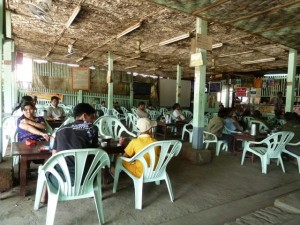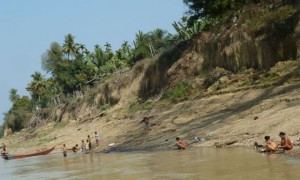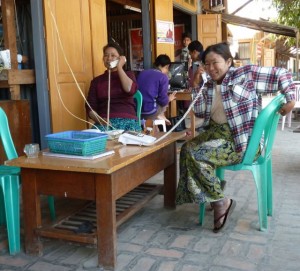-
Archives
- November 2017
- November 2016
- October 2016
- April 2016
- March 2016
- November 2015
- February 2015
- July 2014
- June 2014
- October 2013
- January 2013
- October 2012
- July 2012
- April 2012
- March 2012
- February 2012
- January 2012
- December 2011
- November 2011
- October 2011
- September 2011
- August 2011
- July 2011
- March 2011
- February 2011
- January 2011
- November 2010
- September 2010
- April 2010
- March 2010
- February 2010
- March 2009
- February 2009
- March 2008
- February 2008
- November 2006
- August 2006
- March 2006
- August 2005
- July 2005
-
Meta
Daily Archives: March 29, 2012
Burma: ……and Ends
Eating: One of the best parts of my travels is the eating.
The Burmese are known for their particular style of curry, which has nothing to do with Indian curry. It works like this. You go into a restaurant, which could be a 4-table modest affair on a back road between far flung villages or a popular local eatery in Rangoon, and walk to the kitchen area. There, you select a cooked protein, usually pork, chicken or beef; if you’re by a river or the sea, add options for fish and prawns to that selection. Your protein choice is already cooked in a tomato-based sauce. There are no opportunities to have it cooked fresh for you, nor are you offered various preparations of it. Regardless, that protein is only the beginning. The real glory, and the great fun, of the Burmese curry, are all the vegetables that accompany it. Each restaurant will have its own offerings, which are dished into small bowls and brought to your table along with your bowl of chicken (or whatever). Way out in the country, there might be five vegetables offered, while at that Rangoon hotspot you’d have ten or more. You spoon whichever vegetables you want onto your plate, along with heaps of rice. A tasty broth with various floating greens and sometimes spiced with black pepper comes along, too, which you spoon over everything to make it a bit more blended. And then you eat. The Burmese curry is tasty and filling. I never got tired of it.

Puzzle: On our journey up the Chindwin, each guesthouse we stayed in had a room on the ground floor with the communal toilet hole (no actual commodes). To my surprise, though, there was always plenty of water piped into. However, most of the private homes that we passed on our walks had only outhouse facilities. And plenty of those houses lined the riverway, with their outhouse on the steep open river bank. These were simple long drop affairs, which begs the question: was it all leaching into the river, there to be joined by whatever flowed out of the riverboats and, maybe, even our guesthouse? And if so, was that water then being pumped up to restaurants, there to be boiled to make my dinner soup or my breakfast tea? I couldn’t dwell on this too long. I only hoped that the boiling had been lengthy. Neither Bernard nor I came down with any stomach ailment, though in part I think that’s because I made sure to eat where lots of others were eating, and to do so at the same time as they were. And I also ate and drank only what the locals did. No sense tempting fate by asking for something that might have been sitting around too long.

Dogs: Argentina could take a lesson from Burma on how to manage dogs. The homeless dog situation seems to be well under control and here’s how I think they do it. Noticing that nearly all the dogs on the street were male, I have deduced that only a few females are kept around and that’s purely for breeding. Any females pups in a litter are raised till they have enough meat on them and then they’re eaten. I have no proof of this, but it makes sense to me and I think it’s a clever and practical solution in a country where wasting food is not an option. As a result everyone is friendly to the dogs and they’re all in good physical condition.
Communication: Being in Burma reminded me how relaxed life used to be before cell phones, iPads, computers, et al. Burma is a cash-based economy. There are no ATMs, things are purchased as needed and transactions take place face-to-face. Phone callsl are done at the local phone stand. If you can’t reach someone, you wait, you try again later, you have a cup of sweet tea at the nearby tea shop.

Posted in Burma, Dispatches
Leave a comment










